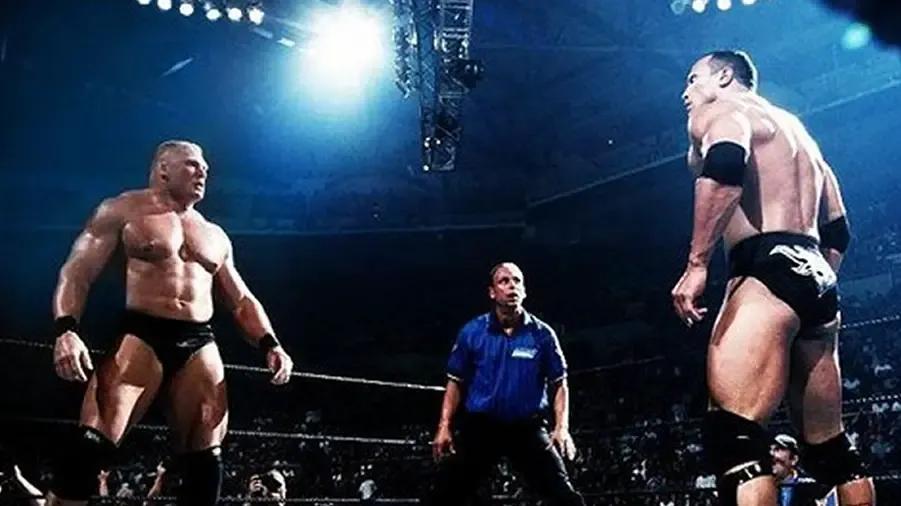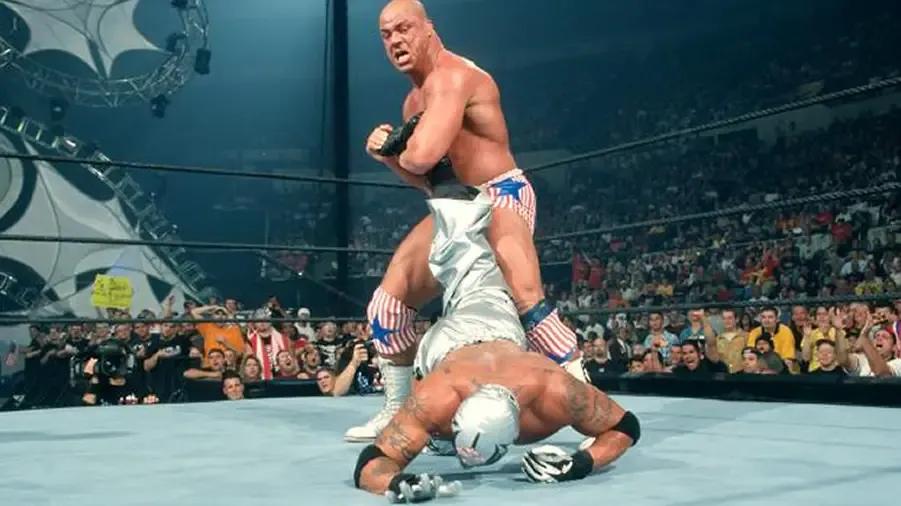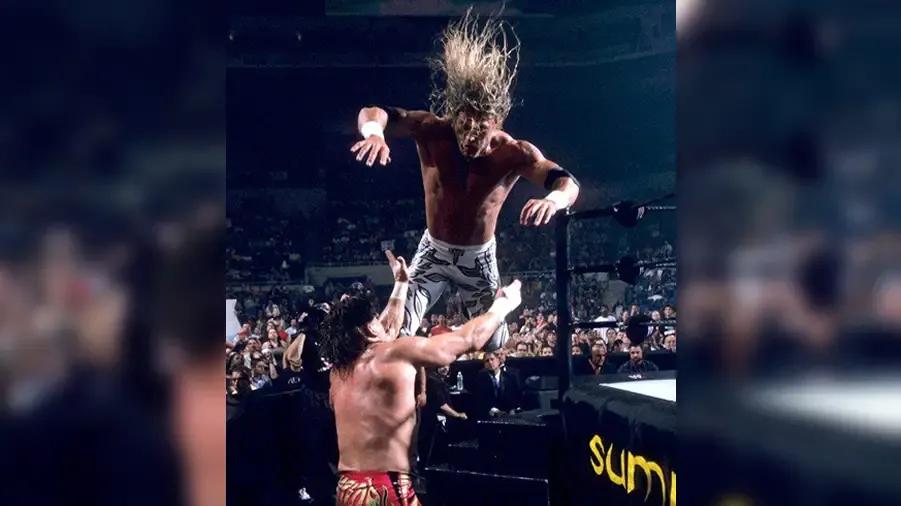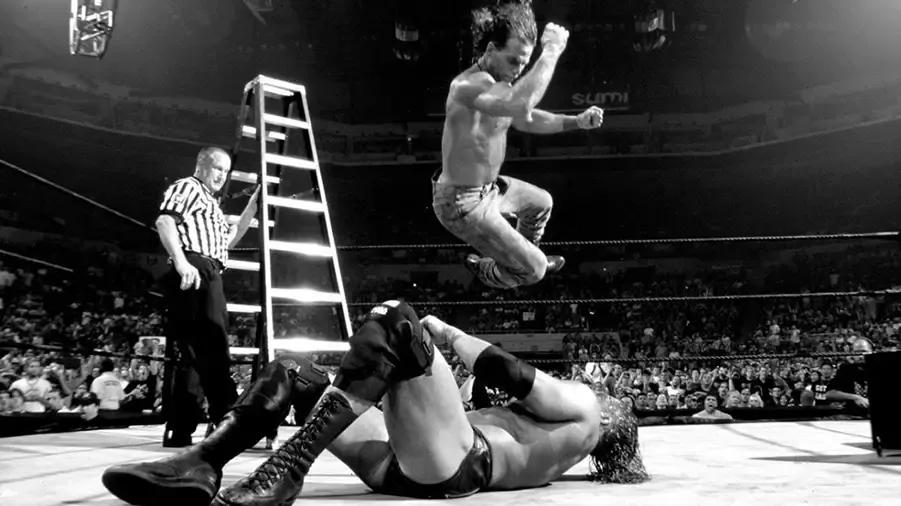10 Things We Learned From WWE SummerSlam 2002
Technically, this wasn't Shawn Michaels' comeback match...

Aug 4, 2018
There are good shows, there are great shows, there are transcendent shows, and then there's SummerSlam 2002. Looking back at the 2002 SummerSlam more than a decade-and-a-half later, and it's hard to move this event from the pedestal of best SummerSlam ever. Grouped with a few other WWE pay-per-views, some of those top-shelf WrestleManias, and you'd be inclined to say that SummerSlam 2002 is one of the greatest pay-per-views ever. And you'd be right.
When you have a double main event in which each component delivers in both the aesthetic sense, as well as in creating general satisfaction, you're on your way to Academia. Shawn Michaels' grand return in which he battled Triple H in an unsanctioned fight to the bitter end is one of the absolute best SummerSlam matches of all time, hitting the bulls-eye in both creating emotional connection, and painting a florid picture. Meanwhile, The Rock putting Brock Lesnar over in the WWE Championship match, after some of the best build-up you'll ever see, is what a torch-passer is supposed to look like.
Factor in an undercard filled with some of the absolute best wrestlers on the planet, and SummerSlam 2002 was designed only to succeed. It did in droves, and it remains the most spectacular of WWE's August offerings.

One reason for the success of SummerSlam 2002 has to do with the wrestlers on hand. Eighteen different men took part in eight matches on the main show, and what a prestigious group it was. Of the 18 men that had a match on SummerSlam's pay-per-view card, 15 of them were either an ex-World Champion, a current World Champion, or a future World Champion.
The Rock, Shawn Michaels, Triple H, The Undertaker, Chris Benoit (a one-day reign in WCW by that point, but eh), Booker T, Chris Jericho, Ric Flair, and Kurt Angle comprised the list of those who'd reached the top of the mountain anywhere between one and 16 times. Rey Mysterio, Edge, Eddie Guerrero, Christian, Rob Van Dam, and Brock Lesnar were those who were anywhere from a few hours to less than four years away from their own run at the top. When five-sixths of your PPV roster consists of the cream of the crop like that, it's mighty impressive.

It may well have been the greatest SummerSlam opening match of all time, as Kurt Angle and Rey Mysterio crammed as much world-class, jaw-droppingly flawless wrestling as they could into less than 10 minutes of match time. If this is indeed the greatest SummerSlam of all time, it got off to a raucous start when Angle and Mysterio showed that even a compact match can ease past the four-star line.
Mysterio admitted in a 2017 interview with The Ringer that he had some reservations about the match at first, unsure if he and Angle would be compatible with one another. But according to Mysterio, Angle was willing to do whatever it took to make the match work, saying: "He told me that he literally wanted me to pull out my whole arsenal and was willing to take every move to make me look good." And that's why Kurt Angle is everyone's Olympic hero.
Of the eight matches on the card, you might only rank Chris Jericho and Ric Flair's undercard clash maybe sixth or seventh best of the night, which is to say that it was a fine match, but not quite on the level of excellence that its co-inhabitants were. The match was memorable for Flair winning with the Figure Four Leglock, a hold that he so rarely garnered victories with, which Jericho was aware of.
In the match's planning stages, Vince told the two that he wanted Flair to go over with an inside cradle, but Jericho suggested the Figure Four, wanting to re-establish the move for Flair's benefit. Flair, whose confidence had been eroded after a rough few years in his career, told Jericho that he didn't deserve to win with the hold, which prompted Jericho to give Flair an impassioned pep talk, reminding the wrestling God of just who he is. Suffice to say, Flair graciously accepted Jericho's handoff.

The summer of 2002 saw a WWE roster in flux, as Raw wrestlers crossed over to SmackDown and vice versa, as the company worked to figure out what brand each of their stars truly belonged on. The likes of Triple H and Chris Jericho crossed back over to Raw, while Eddie Guerrero and Chris Benoit migrated to the blue brand (to name just a few examples).
The various switcheroos altered the booking for SummerSlam, as originally Benoit (who won the IC title from Rob Van Dam on Raw) was to defend the belt at SummerSlam against Edge. However, plans changed when it was decided that they wanted to keep the belt on Raw, so Benoit was booked in a rematch with Van Dam, an inter-brand challenge that would see RVD take the belt back to Eric Bischoff's program. Edge would instead work with Guerrero in a damn fine match unto itself.
The IC title match between Benoit and Van Dam lived up to most expectations, with Benoit twisting and contorting the challenger until Van Dam used his spring-loaded feet of fury to mount the comeback, and ultimately regain the title. With the win, Rob Van Dam helped the IC belt reach a spot in SummerSlam history that will likely never be matched.
It marked the sixth consecutive SummerSlam with an Intercontinental Title change, dating back to the 1997 show in which Stone Cold defeated Owen Hart for the belt. Austin, Triple H, Jeff Jarrett, Chyna, Edge, and RVD collectively worked to break a tie with the five-year streak that stretched from 1988 through 1992, in which the belt changed at all five of those events, only for Shawn Michaels' 1993 retention to end it.

Between 1988 and 2002, the first 15 SummerSlams would see the IC belt defended at 14 of the shows (there was no defence in 1996 due to Ahmed Johnson's injury). Shawn Michaels retained the belt at the 1993 and 1995 shows, but it would change in every other SummerSlam. Yes, 12 of the first 15 SummerSlams would feature an IC title change. The fact that the belt has only changed at two SummerSlams from 2003 onward (2008 and 2014) says a lot, really.
In fact, following the Benoit/RVD clash, the belt would not be defended in a traditional one-on-one match again at SummerSlam until 2009, when Rey Mysterio retained the belt over Dolph Ziggler. The belt wasn't even on the line in 2003, 2005, or 2006, while 2004 and 2007 saw it defended in triple threats, while Santino Marella won Kofi Kingston's belt in a mixed tag team match in 2008. How times change.

There were questions as to whether or not Shawn Michaels would be to go at a level anywhere comparable to his prime. Fan expectations were high going into his unsanctioned match with Triple H, and it seemed risky to show old footage of HBK in video packages, taking to the air with the greatest of ease - what if he couldn't be that Shawn Michaels any more? Of course, Michaels delivered a performance for the ages, making any and all doubters look like fools.
To make his comeback match all the more impressive, Michaels claims that he barely rehearsed anything. He and Triple H did a practice session the Friday before SummerSlam, with the initial intent of trying different spots out. Michaels, who admits to not being the type to practice, ran the ropes a few times, came off the top rope once, and also did a sunset flip on Helmsley. Per Michaels' account, he halted the practice session there, believing that rehearsal wasn't going to help him, that he would have to actually do the spots in a real match.
[embed
[/embed]
Part of the match's underlying story was the idea that Triple H might be able to take full advantage of a rusty Michaels. In WWE canon, Michaels had not wrestled since Steve Austin planted him with a Stunner at the conclusion of WrestleMania XIV almost four-and-a-half years earlier. While that little note would only enhance the match's story, it turns out that it's not exactly true.
This is nitpicky, and something that any sensible fan would be willing to forgive, but it's still worth a mention. During a period in the year 2000 when Michaels trained wrestlers down in San Antonio, he performed in one match for the Texas Wrestling Alliance. It was in April 2000 that Michaels warred with former partner and nemesis Paul Diamond (then working as "Venum") in a hardcore-based match. Hope this doesn't ruin SummerSlam 2000 for ya any.
After only five months on the main roster, Brock Lesnar would be getting some pretty hefty spoils in the form of a SummerSlam victory over The Rock for the WWE Championship. In the closing stages of the match, Lesnar and Rock aggressively countered each other's finisher attempts prior to Lesnar hoisting Rock onto his shoulders, before sending him crashing down with a spine-jarring F-5, leading to the one-two-three.
Lesnar would claim years later that The Rock insisted on putting him over clean as a sheet. This simple act of professionalism on Rock's part was due to Rock understanding that somebody needed to be strong in his forthcoming absence (Rock, in fact, never had another full-time wrestling run in him), and that it was his duty to help make Lesnar's ascent as swift and emphatic as possible. Other champions may have undercut their successor, but Rock is most certainly not one of them.

If you're over the age of 25, what were you doing one month after your 25th birthday? Unless you're Brock Lesnar reading this in between hunting for bears with nothing but a set of brass knuckles, you probably weren't winning the WWE Championship at a major pay-per-view. For Brock Lesnar, conquering the WWE mountain at such a young age is a mighty impressive achievement.
With the win over Rock, Lesnar became the youngest WWE Champion of all time at 25 years, one month, and two weeks old. This broke a near decade-old record set by Yokozuna, who was 26 years, six months old when he defeated Bret Hart in the main event of WrestleMania IX for the belt. Please note, some of you, that this concerns the *WWE* Championship only. Yes, Randy Orton won the World Heavyweight title at age 24 in 2004. No, that's not what we're discussing here. Carry on.
There are good shows, there are great shows, there are transcendent shows, and then there's SummerSlam 2002. Looking back at the 2002 SummerSlam more than a decade-and-a-half later, and it's hard to move this event from the pedestal of best SummerSlam ever. Grouped with a few other WWE pay-per-views, some of those top-shelf WrestleManias, and you'd be inclined to say that SummerSlam 2002 is one of the greatest pay-per-views ever. And you'd be right.
When you have a double main event in which each component delivers in both the aesthetic sense, as well as in creating general satisfaction, you're on your way to Academia. Shawn Michaels' grand return in which he battled Triple H in an unsanctioned fight to the bitter end is one of the absolute best SummerSlam matches of all time, hitting the bulls-eye in both creating emotional connection, and painting a florid picture. Meanwhile, The Rock putting Brock Lesnar over in the WWE Championship match, after some of the best build-up you'll ever see, is what a torch-passer is supposed to look like.
Factor in an undercard filled with some of the absolute best wrestlers on the planet, and SummerSlam 2002 was designed only to succeed. It did in droves, and it remains the most spectacular of WWE's August offerings.

One reason for the success of SummerSlam 2002 has to do with the wrestlers on hand. Eighteen different men took part in eight matches on the main show, and what a prestigious group it was. Of the 18 men that had a match on SummerSlam's pay-per-view card, 15 of them were either an ex-World Champion, a current World Champion, or a future World Champion.
The Rock, Shawn Michaels, Triple H, The Undertaker, Chris Benoit (a one-day reign in WCW by that point, but eh), Booker T, Chris Jericho, Ric Flair, and Kurt Angle comprised the list of those who'd reached the top of the mountain anywhere between one and 16 times. Rey Mysterio, Edge, Eddie Guerrero, Christian, Rob Van Dam, and Brock Lesnar were those who were anywhere from a few hours to less than four years away from their own run at the top. When five-sixths of your PPV roster consists of the cream of the crop like that, it's mighty impressive.

It may well have been the greatest SummerSlam opening match of all time, as Kurt Angle and Rey Mysterio crammed as much world-class, jaw-droppingly flawless wrestling as they could into less than 10 minutes of match time. If this is indeed the greatest SummerSlam of all time, it got off to a raucous start when Angle and Mysterio showed that even a compact match can ease past the four-star line.
Mysterio admitted in a 2017 interview with The Ringer that he had some reservations about the match at first, unsure if he and Angle would be compatible with one another. But according to Mysterio, Angle was willing to do whatever it took to make the match work, saying: "He told me that he literally wanted me to pull out my whole arsenal and was willing to take every move to make me look good." And that's why Kurt Angle is everyone's Olympic hero.
Of the eight matches on the card, you might only rank Chris Jericho and Ric Flair's undercard clash maybe sixth or seventh best of the night, which is to say that it was a fine match, but not quite on the level of excellence that its co-inhabitants were. The match was memorable for Flair winning with the Figure Four Leglock, a hold that he so rarely garnered victories with, which Jericho was aware of.
In the match's planning stages, Vince told the two that he wanted Flair to go over with an inside cradle, but Jericho suggested the Figure Four, wanting to re-establish the move for Flair's benefit. Flair, whose confidence had been eroded after a rough few years in his career, told Jericho that he didn't deserve to win with the hold, which prompted Jericho to give Flair an impassioned pep talk, reminding the wrestling God of just who he is. Suffice to say, Flair graciously accepted Jericho's handoff.

The summer of 2002 saw a WWE roster in flux, as Raw wrestlers crossed over to SmackDown and vice versa, as the company worked to figure out what brand each of their stars truly belonged on. The likes of Triple H and Chris Jericho crossed back over to Raw, while Eddie Guerrero and Chris Benoit migrated to the blue brand (to name just a few examples).
The various switcheroos altered the booking for SummerSlam, as originally Benoit (who won the IC title from Rob Van Dam on Raw) was to defend the belt at SummerSlam against Edge. However, plans changed when it was decided that they wanted to keep the belt on Raw, so Benoit was booked in a rematch with Van Dam, an inter-brand challenge that would see RVD take the belt back to Eric Bischoff's program. Edge would instead work with Guerrero in a damn fine match unto itself.
The IC title match between Benoit and Van Dam lived up to most expectations, with Benoit twisting and contorting the challenger until Van Dam used his spring-loaded feet of fury to mount the comeback, and ultimately regain the title. With the win, Rob Van Dam helped the IC belt reach a spot in SummerSlam history that will likely never be matched.
It marked the sixth consecutive SummerSlam with an Intercontinental Title change, dating back to the 1997 show in which Stone Cold defeated Owen Hart for the belt. Austin, Triple H, Jeff Jarrett, Chyna, Edge, and RVD collectively worked to break a tie with the five-year streak that stretched from 1988 through 1992, in which the belt changed at all five of those events, only for Shawn Michaels' 1993 retention to end it.

Between 1988 and 2002, the first 15 SummerSlams would see the IC belt defended at 14 of the shows (there was no defence in 1996 due to Ahmed Johnson's injury). Shawn Michaels retained the belt at the 1993 and 1995 shows, but it would change in every other SummerSlam. Yes, 12 of the first 15 SummerSlams would feature an IC title change. The fact that the belt has only changed at two SummerSlams from 2003 onward (2008 and 2014) says a lot, really.
In fact, following the Benoit/RVD clash, the belt would not be defended in a traditional one-on-one match again at SummerSlam until 2009, when Rey Mysterio retained the belt over Dolph Ziggler. The belt wasn't even on the line in 2003, 2005, or 2006, while 2004 and 2007 saw it defended in triple threats, while Santino Marella won Kofi Kingston's belt in a mixed tag team match in 2008. How times change.

There were questions as to whether or not Shawn Michaels would be to go at a level anywhere comparable to his prime. Fan expectations were high going into his unsanctioned match with Triple H, and it seemed risky to show old footage of HBK in video packages, taking to the air with the greatest of ease - what if he couldn't be that Shawn Michaels any more? Of course, Michaels delivered a performance for the ages, making any and all doubters look like fools.
To make his comeback match all the more impressive, Michaels claims that he barely rehearsed anything. He and Triple H did a practice session the Friday before SummerSlam, with the initial intent of trying different spots out. Michaels, who admits to not being the type to practice, ran the ropes a few times, came off the top rope once, and also did a sunset flip on Helmsley. Per Michaels' account, he halted the practice session there, believing that rehearsal wasn't going to help him, that he would have to actually do the spots in a real match.
[embed
[/embed]
Part of the match's underlying story was the idea that Triple H might be able to take full advantage of a rusty Michaels. In WWE canon, Michaels had not wrestled since Steve Austin planted him with a Stunner at the conclusion of WrestleMania XIV almost four-and-a-half years earlier. While that little note would only enhance the match's story, it turns out that it's not exactly true.
This is nitpicky, and something that any sensible fan would be willing to forgive, but it's still worth a mention. During a period in the year 2000 when Michaels trained wrestlers down in San Antonio, he performed in one match for the Texas Wrestling Alliance. It was in April 2000 that Michaels warred with former partner and nemesis Paul Diamond (then working as "Venum") in a hardcore-based match. Hope this doesn't ruin SummerSlam 2000 for ya any.
After only five months on the main roster, Brock Lesnar would be getting some pretty hefty spoils in the form of a SummerSlam victory over The Rock for the WWE Championship. In the closing stages of the match, Lesnar and Rock aggressively countered each other's finisher attempts prior to Lesnar hoisting Rock onto his shoulders, before sending him crashing down with a spine-jarring F-5, leading to the one-two-three.
Lesnar would claim years later that The Rock insisted on putting him over clean as a sheet. This simple act of professionalism on Rock's part was due to Rock understanding that somebody needed to be strong in his forthcoming absence (Rock, in fact, never had another full-time wrestling run in him), and that it was his duty to help make Lesnar's ascent as swift and emphatic as possible. Other champions may have undercut their successor, but Rock is most certainly not one of them.

If you're over the age of 25, what were you doing one month after your 25th birthday? Unless you're Brock Lesnar reading this in between hunting for bears with nothing but a set of brass knuckles, you probably weren't winning the WWE Championship at a major pay-per-view. For Brock Lesnar, conquering the WWE mountain at such a young age is a mighty impressive achievement.
With the win over Rock, Lesnar became the youngest WWE Champion of all time at 25 years, one month, and two weeks old. This broke a near decade-old record set by Yokozuna, who was 26 years, six months old when he defeated Bret Hart in the main event of WrestleMania IX for the belt. Please note, some of you, that this concerns the *WWE* Championship only. Yes, Randy Orton won the World Heavyweight title at age 24 in 2004. No, that's not what we're discussing here. Carry on.